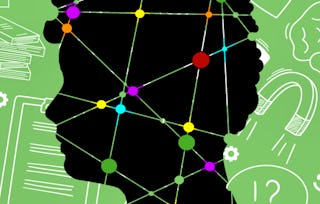According to legend, inscribed on walls of the temple on the sacred site of Delphi in Ancient Greece were two premier injunctions: NOTHING IN EXCESS, and KNOW THYSELF. This course will be an examination of the latter injunction in an effort to discover what self-knowledge is, why it might be valuable, and what, if any, limitations it might face. What is missing from a person lacking in self-knowledge that makes her less wise, virtuous, or competent in certain areas than others who have this capacity, and what if anything might she do to fill that gap? Historical sources as well as recent research in philosophy, experimental social psychology, and neuroscience will inform our investigation, in the course of which we will become students of our own dreams, and cultivate some meditative practices.

Know Thyself - The Value and Limits of Self-Knowledge: The Examined Life

Know Thyself - The Value and Limits of Self-Knowledge: The Examined Life

Instructor: Mitchell Green
78,151 already enrolled
Included with
(814 reviews)
Skills you'll gain
Details to know

Add to your LinkedIn profile
See how employees at top companies are mastering in-demand skills

There are 6 modules in this course
What's included
4 readings1 discussion prompt
At his trial, charged with corrupting the Athenian youth, Socrates isn't exactly apologetic. He tells the jury to their faces that they only charged him because they don't like that he forces them to confront uncomfortable truths. Somewhat unsurprisingly, the jury sentences him to death. Socrates accepts the sentence unfazed, famously stating that he'd rather die than stop making people think, as 'an unexamined life is not worth living'. In this module we will examine this dictum and ask: was Socrates right to throw shade on the unexamimed life?
What's included
8 videos6 readings7 assignments3 discussion prompts
Are you dreaming right now? How do you know you're not? Rene Descartes set himself a pretty titanic task: to doubt absolutely everything he cannot be certain of - even that the world exists! - and then try to see if we can rebuild our knowledge of ourselves and the world only from what we can be really certain of. In the process, he formulated some provocative thoughts on the radical separation of the mind from the body.
What's included
9 videos7 readings6 assignments3 discussion prompts
Descartes' dualistic picture of the mind-body relation was highly influential for centuries. A vocal minority of thinkers challenged dualism, but only in the Twentieth Century did Gilbert Ryle manage to discern how Descartes' dualistic reasoning went wrong. In understanding Ryle's approach, we will also gain an appreciation of how know-how is a legitimate form of knowledge, and of how one way of gaining self-knowledge is by looking outward rather than looking inward.
What's included
8 videos7 readings5 assignments3 discussion prompts
Is there such a thing as a human nature? And if there is, how can we know what it is? In this module we will look at how the concept of human nature is used and potentially misused, and what can all this tell us about ourselves. And finally: can human nature be changed?
What's included
7 videos8 readings5 assignments4 discussion prompts
What's included
5 readings1 peer review1 discussion prompt
Instructor

Offered by
Explore more from Philosophy
 Status: Preview
Status: PreviewThe University of Edinburgh
 Status: Free Trial
Status: Free TrialUniversity of Colorado Boulder
 Status: Free Trial
Status: Free TrialUniversity of Colorado System
 Status: Free Trial
Status: Free TrialAmerican Psychological Association
Why people choose Coursera for their career

Felipe M.

Jennifer J.

Larry W.

Chaitanya A.
Learner reviews
- 5 stars
75.55%
- 4 stars
19.04%
- 3 stars
3.43%
- 2 stars
0.85%
- 1 star
1.10%
Showing 3 of 814
Reviewed on May 16, 2020
This was incredibly fun and relatively easy to follow. The additional readings were also helpful in painting a better picture of the topics. Very recommended!
Reviewed on Sep 5, 2020
I wasn't sure what to really expect but this was a great course to get me thinking and challenge me along the way. The meditative moments were SO lovely.
Reviewed on Jul 6, 2020
A really good course about different philosophical ideas from several philosophers about the examination of life. The teaching technique is really good and easy to understand.

Open new doors with Coursera Plus
Unlimited access to 10,000+ world-class courses, hands-on projects, and job-ready certificate programs - all included in your subscription
Advance your career with an online degree
Earn a degree from world-class universities - 100% online
Join over 3,400 global companies that choose Coursera for Business
Upskill your employees to excel in the digital economy
Frequently asked questions
To access the course materials, assignments and to earn a Certificate, you will need to purchase the Certificate experience when you enroll in a course. You can try a Free Trial instead, or apply for Financial Aid. The course may offer 'Full Course, No Certificate' instead. This option lets you see all course materials, submit required assessments, and get a final grade. This also means that you will not be able to purchase a Certificate experience.
When you purchase a Certificate you get access to all course materials, including graded assignments. Upon completing the course, your electronic Certificate will be added to your Accomplishments page - from there, you can print your Certificate or add it to your LinkedIn profile.
Yes. In select learning programs, you can apply for financial aid or a scholarship if you can’t afford the enrollment fee. If fin aid or scholarship is available for your learning program selection, you’ll find a link to apply on the description page.
More questions
Financial aid available,
¹ Some assignments in this course are AI-graded. For these assignments, your data will be used in accordance with Coursera's Privacy Notice.

